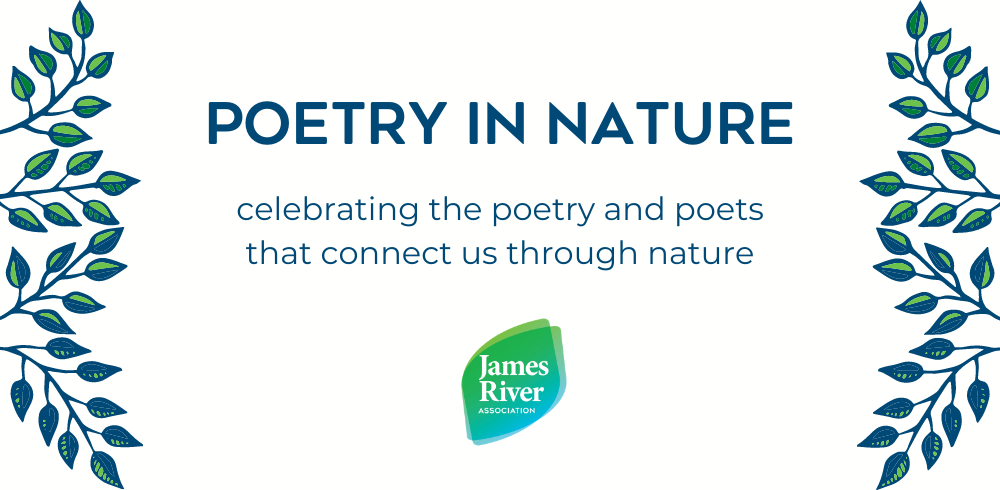In honor of National Poetry Month, we’ll be celebrating the power of poetry and its ability to profoundly connect us with nature – and each other – by highlighting a nature themed poem every Monday. To quote Lucille Clifton, “I think that we’re beginning to remember that the first poets didn’t come out of a classroom, that poetry began when somebody walked off of a savanna or out of a cave and looked up at the sky with wonder and said, “Ahhh.” That was the first poem.”
(Re)Connect to Nature – a Gift of Words
Amber Ellis
The James River offers so many places to experience feelings of awe that can uniquely be captured in poetry. Join our Senior Watershed Restoration Manager, Amber Ellis, for a poetry exercise that will allow you to take in the beauty around you, reflect through writing, and offer a “Gift of Words” to your local waterway. Even though Amber highlights fall as her favorite season, we know many feel the same inspiration about spring and its promise of renewal, hopeful blooms, and thriving wildlife. Find the exercise here. All you need is 30 minutes, a creek or river, paper, a pen, and an appreciation for the nature that surrounds you.
Slate under red leaves
Shimmering light floats downstream
Your world is mine too
Water
Wendell Berry
I was born in a drought year. That summer
my mother waited in the house, enclosed
in the sun and the dry ceaseless wind,
for the men to come back in the evenings,
bringing water from a distant spring.
veins of leaves ran dry, roots shrank.
And all my life I have dreaded the return
of that year, sure that it still is
somewhere, like a dead enemy’s soul.
Fear of dust in my mouth is always with me,
and I am the faithful husband of the rain,
I love the water of wells and springs
and the taste of roofs in the water of cisterns.
I am a dry man whose thirst is praise
of clouds, and whose mind is something of a cup.
My sweetness is to wake in the night
after days of dry heat, hearing the rain.
Taken from The Ecopoetry Anthology, edited by Ann Fisher-Wirth and Laura-Gray Street.
“Definitive and daring, The Ecopoetry Anthology is the authoritative collection of contemporary American poetry about nature and the environment–in all its glory and challenge. From praise to lament, the work covers the range of human response to an increasingly complex and often disturbing natural world and inquires of our human place in a vastness beyond the human.” – Amazon
Wendell Erdman Berry (born August 5, 1934) is an American novelist, poet, essayist, environmental activist, cultural critic, and farmer. He is an elected member of the Fellowship of Southern Writers, a recipient of The National Humanities Medal, and the Jefferson Lecturer for 2012. (from wikipedia)
Language
CAMILLE T. DUNGY
Silence is one part of speech, the war cry
of wind down a mountain pass another.
A stranger’s voice echoing through lonely
valleys, a lover’s voice rising so close
it’s your own tongue: these are keys to cipher,
the way the high hawk’s key unlocks the throat
of the sky and the coyote’s yip knocks
it shut, the way the aspens’ bells conform
to the breeze while the rapid’s drum defines
resistance. Sage speaks with one voice, pinyon
with another. Rock, wind her hand, water
her brush, spells and then scatters her demands.
some notes tear and pebble our paths. Some notes
gather: the bank we map our lives around.
FROM BLACK NATURE: FOUR CENTURIES OF AFRICAN AMERICAN NATURE POETRY EDITED BY CAMILLE T. DUNGY. COPYRIGHT 2006 BY CAMILLE T. DUNGY. REPRINTED BY PERMISSION OF RED HEN PRESS.
More information about the book, the poems and the poets can be found at ‘Black Nature’: Poems Of Promise And Survival.
Camille T. Dungy is editor of Black Nature and the author of What to Eat, What to Drink, What to Leave for Poison. She is an associate professor in the creative writing department at San Francisco State University.
The “Carrying Our Words” complete poem, in both original O’odham and English translation, can be found on https://poets.org/poem/carrying-our-words
Carrying Our Words
Ofelia Zepeda
We travel carrying our words.
We arrive at the ocean.
With our words we are able to speak
of the sounds of thunderous waves.
We speak of how majestic it is,
of the ocean power that gifts us songs.
We sing of our respect
and call it our relative.
Translated into English from O’odham by the poet.
Ofelia Zepeda is a Tohono O’odham poet and intellectual. She is Regents’ Professor of Tohono O’odham language and linguistics and Director of the American Indian Language Development Institute (AILDI) at The University of Arizona. Zepeda is the editor for Sun Tracks, a series of books that focuses on the work of Native American artists and writers, published by the University of Arizona Press. (from wikipedia)

